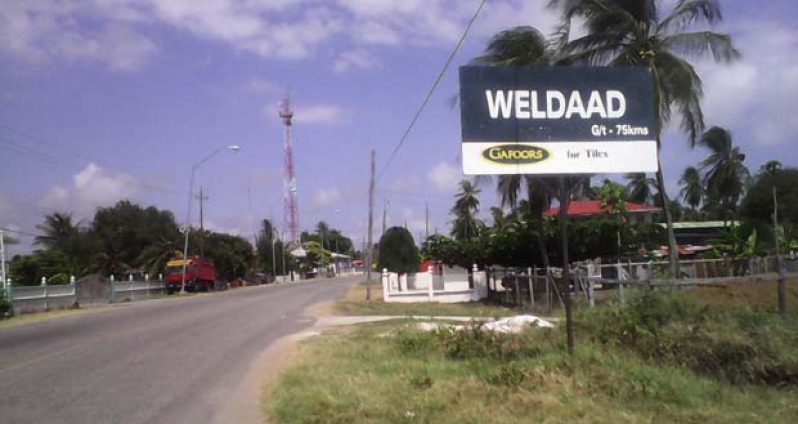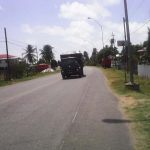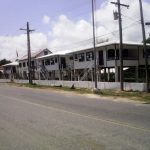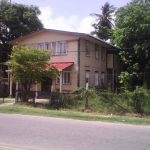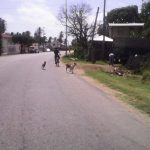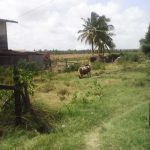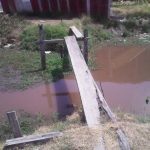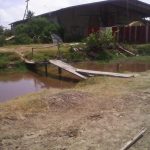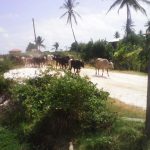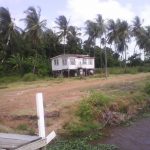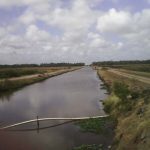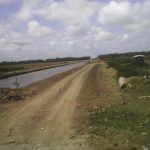Here I was surrounded by smiling children with cheery dimples all heckling with childish curiosity as I pelted questions at their equally excited mothers, who were themselves excited at being the object of media attention. Some peeped at me shyly from behind their buxom mothers, clinging to their skirts and peeking out every now and then, their eyes mirroring their bewilderment at what was unfolding before their eyes.
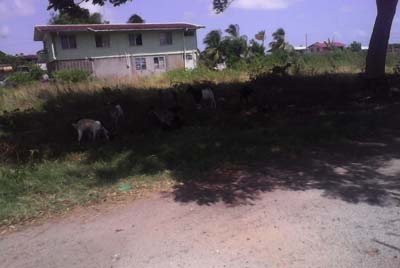
Burly men and chiselled looking young men looked on curiously from nearby guessing the reason of my presence in hushed tones, some of them eyeing me suspiciously. Their eyes still showing their hope that they will become the next object of my focus.
Young girls strolled up and down the street, their mini-skirts swishing as they rolled their hips enticingly much to the delight of the young males who hooted at them. Such advances were of course met with the rolling of eyeballs and great swearing by the saucy lasses who ‘minced no matter’ in staunch terms of informing their male pursuits that they were definitely ‘not their type’ as the country girls would say.

The cows seemed to be trying their best with the almost sun-dried grass and shrubs by the roadside and sheep bleated loudly as they darted down the dusty dams to sip water from the trenches as the tropical sun broiled down mercilessly.
I was just overwhelmed by the bustle and festive aura that seemed to surround this village, so there I was breathing deeply the fresh, crisp ‘country breeze’ as my eyes took in with wonder the cluster of little homely cottages and few small shops nearby. There were no schools here. And what I noticed was a police station and a post office, but the jolly villagers seemed not to mind their lack of sophisticated amenities.
This village does not feature majestic buildings, posh shops, fancy stores or elegant boutiques like many others, but what may cause it to top the list is its quiet existence, fuelled by the humility and charm of its residents, and its dazzling aura of simplicity. Actually there are just a few small shops there from which villagers obtain their groceries and household supplies. Some however prefer to travel to the somewhat distant Bushlot, where they
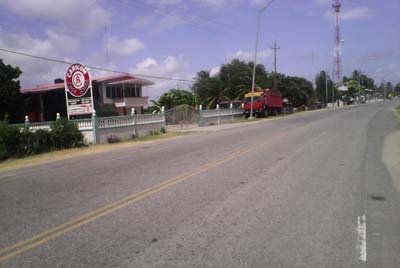
claim the same items are obtained at far cheaper prices.
I looked longingly at a few trees that seemed to be groaning under their weight of ripened mangoes, while the branches of breadfruit trees were almost sweeping the earth with the weight of the large healthy looking fruits upon them.
I almost swooned in delight as I passed a few yards where bare-backed youths frolicked in the sand or were engaged in fiery clashes over whom were the winners in the games of marble and hop-scotch they were playing.

Sheep and cattle grazed lazily in open fields, seemingly savouring their afternoon meals with relish, assured that there was much to serve around for a long time to come.
From open spaces between the trees I caught glimpses of the cattle farmers rounding up their herds that were bellowing their protest at being disturbed from their ‘grassy munching.’
I was in the quiet and quite arresting village of Weldaad on the West Coast of Berbice located just about forty miles from Georgetown.
This village is flanked by the seemingly slightly larger villages of Golden Fleece to the west and Hope to the east.
Sunrise in this village is often expected at 05:37 hours and sunset at 17:36 hours. This village possesses latitude readings of 6.5000°, with Longitude records of. 57.6833°
Weldaad can also br described as a community in Region 5 (Mahaica/Berbice) along the Atlantic Ocean coast, located at 6°29?15?N 57°41?0?W /

6.48750°N 57.68333°W / 6.48750; -57.68333 with Coordinates of 6°29?15?N 57°41?0?W / 6.48750°N 57.68333°W / 6.48750; -57.68333.
It has a post office and a police station. The name of this village originated from way back from our Dutch colonial history.
This village has just over twenty households with a population of about 200, most of whom are of African descent. But of course one can surely find a few persons of mixed race there as well.
Chatting with residents
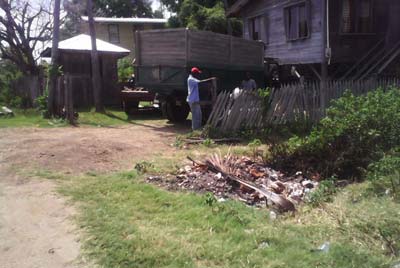
Among the many persons who were more than ready to interact with the Sunday Chronicle was Sharon Smith, a housewife who tried her hand also at selling snacks to youths around the village.
The very jovial woman indicated that unemployment was a major setback for the village since a large number of students who would have written CXC examinations are at home, or wander the streets as they desperately await responses from places where they applied for jobs. She noted that just a few who relocated to the city obtained good jobs but they often cannot afford the expenses of housing, and other city responsibilities.
Mrs. Smith noted that because of this reason there are several young and intelligent males and females remaining in the village, deeply frustrated by the problem of unemployment. She added that all the schools outside of the village would have been already filled with teachers thus making it impossible
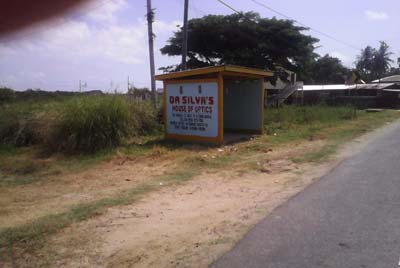
for qualified school leavers to access jobs there.
Inadequate recreational opportunities were also another issue that seemed to peeve Mrs. Smith. “Weldaad is in dire need of adequate recreational facilities for the youths…. You see sir, we have very talented athletes and sports oriented youths here. But our village is still underdeveloped and allows no scope for them to further or develop their skills and talents. As it is we are very contented and are glad with the peace we enjoy here but we are hoping that authorities can look into our welfare a little more”
She declared that there is need for more corporate and government intervention in the village, emphasising that Weldaad over the years have been champions in the circle tennis and football arena. She said over the years this game has disappeared entirely in the village due to lack of funds to provide game items, or unavailability of incentives for players.

I was lucky to bump into Dion Felix, who was a student I taught while being employed as a teacher at the Belladrum Primary School. She is presently residing in the city where she is employed as a beautician but visits the village at every given opportunity since she is drawn by its makings.
“Sir it’s a pleasure to see that you are focusing on this little village. Though I have moved to the city I come back to this village at least twice per month to mingle with residents and to enjoy the peaceful atmosphere. This is by far one of the most beautiful and peaceful and impressive villages on the West Coast of Berbice.” “Residents here are very contented, peaceful people who live here with deep love and unity. It is the rich camaraderie we have here that keeps me coming back. I am always drawn to this village for its simplicity and the humble existence of our villagers”.
What struck me and was very pleasing to the eyes, is the manner in which villagers exuded a ‘ready to go attitude’, and seemed ready to ‘fix things’ in

the village and not wait on the relevant authorities.
The elderly but camera shy ‘Papa’ as he prefers to be called was glad to shed light on the makings of the little village.
“We ain’t get no fancy business places or big time shops and such likes here. But we exist quite fine and in peace with each other. In this village, everyone looks out for the other and there are no racial differences here. In Weldaad, everyone live as one….”
He chatted with me at his gate and from there I could see a pot bubbling on the fireside in his yard emitting an aroma that caused my stomach to growl in anticipation. He explained that he was cooking his favourite meal of pigeon peas cook-up rice and salted fish, with pig tail to add that special ‘countryside zing’ to it. Being an ‘old soul’ who makes hygiene a priority he was also burning his garbage nearby since he claimed he was afraid of airborne diseases and those carried by mosquitoes.
As we walked about the village a few, young men could be seen weeding drains, and yards overgrown with bushes, whiles others were observed mixing cement by the roadside to make repairs and alterations to their homes.
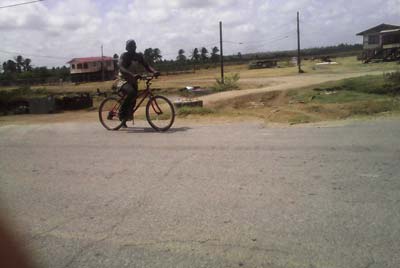
We were very surprised when we were told that some of the lovely cottage houses in the village were actually built through combined family efforts. Sure it seemed, villagers are actually gifted tradesmen.
Housing and Employment in Weldaad
In years gone by houses were traditionally made of wood and stands on stilt-like columns. Recently houses made of concrete and ‘breeze blocks’ are becoming more common. The people of Weldaad are very friendly and walk long distances in search of work. Historically the men of this would walk for miles daily to “dig shovel”, digging canals and waterways in the cane fields or “cut cane” at the Bath or Blairmont Estates.
The hardworking residents there are either engaged in farming, poultry rearing, and to a lesser extent broom-making. Hence, it is a customary sight to see vegetables and ground provision farmers making their treks through the village with their produce laden on donkey and horse-drawn carts.

Regular employment abounds only periodically during the rice harvesting seasons, when rice farmers in Calcutta (Mahaicony District) and outside villages will require plenty of manual labour for harvesting, paddy drying and, of course, rice milling.
Like many villages on Guyana’s coastal plain Weldaad is laid out as a ribbon settlement with house lots on either side of the two-lane highway. Sandy dams with shallow canals on either side are situated perpendicular to the public highway at the ends and middle of the village. Located south of the village is an area of land called the “backdam,” consisting mainly of coconut trees and a variety of fruit trees interspersed. The trees are badly managed but very productive and serve as a source of income and food for many villagers. The coconuts in many cases are used for cooking or making oil. Some residents transport mangoes and other fruits from this area to the city, where they are sold at Bourda or Stabroek Markets. In the backdam any particular plot of land and its vegetation is generally thought to be the property of the person or family directly north of the plot.

A few striking new changes
Things have indeed changed as is evident even in the mannerisms and dress code of villagers. There was a time when the majority, especially the women, could be picked out from among large crowds by their somewhat tactless attire. Now the very ‘country lasses’ pack a severe punch with their now modern and sophisticated dress codes.
Cattle rearing and poultry farming to some extent seem to be the main source of livelihood. However, the village to some extent has now produced a few of its own teachers, clerks and intellectuals who are luckily employed both in and outside the village.
Cattle farmers provide fresh milk to villagers and of course meat. Still present in the village, too, are a few vegetable vendors marketing their items by
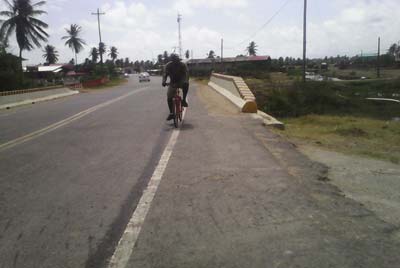
pulling a cart and screaming their heads off, to attract the housewives who would come rushing out to select whatever they could for their kitchen and refrigerators.
Some villagers prefer to drive minibuses while many sell snacks and other goodies in the school compounds at Belladrum, a short distance away. While it has been drastically reduced over the years, some fishmongers still ply their trade in the village,.
Transportation
Several years ago, hire cars were indeed the main form of transportation in Weldaad, and of course the donkey and horse drawn carts were quite popular. Villagers were more prone and seemed quite more comfortable with the environs of a hire car, than the minibuses which traverse the roads continuously.
Today those cars have disappeared and villagers have to now depend on the very minibuses they avoided and sometimes the wait can be very lengthy, since most of these buses now operate the Georgetown to Berbice route.
Some villagers would normally use bicycles for short distances and even a few motor cycles are still around. And guess what? Some of the youths are really getting smart and are moving around on roller shoes which they claim is a more exciting form of transport.
Another thing that struck me on entering the village was that several large sections were actually wide open spaces where lush green trees and mystical coconut palms swayed mysteriously in the wind. This was further accentuated with an array of grass species which somehow seemed to lend a ‘tropical air’ to the village.
Weldaad in times gone by…
Way back in the 1950s according one villager, Weldaad was a ‘very bushy settlement’ where one had to climb a tree to view the few buildings in the area. According to a village elder, Francine Fraser, the level of ‘harmony and deep love’ between villagers in those days has changed drastically whereby youths have grown disrespectful of their elders and would torment them on a daily basis as they traverse the village.
Just in case you are wondering what the village was like unto ‘donkey years ago’, 74 year-old Frank Davidson who has lived there all his life was more than ready to tell with an almost boyish gleam in his eyes and he took himself back to the days when he was a little starry-eyed boy chasing after lizards and mongoose in the wide open pastures.
“I barn and grow up in this village and ah neva left it fuh guh live nowhere else. In me time as a lil bai if the village had about seven house if it had suh much… The whole place was full ah bush and plenty fruit trees like wha yuh still ah see he today. All we could ah see was nuff bush, tall trees and big wide open fields. We nah bin get no shap and dem thing dah. We had to travel far fuh get grocery and good drinking watah. Most people used tuh bile de watah fram de riva and use it fuh drink and to cook food. We nah had no street lights and de place use d to be ‘pitch black’ at night time…”
Mr. Davison explained that as time went by persons descended on the location which was popular for its rich farming soil and soon began to purchase plots of land for building. Hence today the village is one of the more pleasant locations in West Berbice.
Although Weldaad is still caught in the grips of gradual development it still holds its almost majestic aura of simplicity that is further accentuated by the serene demeanour of residents who exist in great humility.
Today residents there are still residents employed as farmers, a few carpenters and masons, while a large number are employed at rice mills along the East Coast of Demerara. Of course there are quite a few cattle farmers still around.
Entertainment
This village has no possible avenues for any vibrant form of entertainment but that does not seem to bother residents since they can hop onto their bicycles and travel to neighbouring villages and have a blast on the weekends.
The elderly folks in most cases are contented to purchase their alcohol and drink it in the confines of their homes as they watch television programmes or listen to ‘oldies’ via tape records or small stereo sets.
The youths however prefer to enjoy the many concept parties hosted at the Co-co-co-Bana Disco at Belladrum from time to time or would enjoy ‘chilling’ by one of the many hangout bars that can be found in adjoining villages. They however eagerly anticipate the massive live shows and parties that are customarily hosted by various promoters at the Central Mahaicony Community Centre Ground some six miles away
I could not seem to find any church around and from enquiries I was told that most villagers will attend the Seventh Day Adventist Church in El Dorado, just about a mile away, for worshipping purposes.
Employment
Their folklore
On Emancipation Day every year, villagers would don African wear and would sing, dance and engage in great festivity in the streets. But the climax of theses festivities are usually centered on the massive Soiree event hosted at Hopetown some distance away
In some cases according to one villager there is also a candlelight parade, where villagers would walk through the village singing folk songs.
Some elderly folks in the village reflected on nights of story-telling around campfires, picnics in the woods or savannahs, and of course the traditional yearly Soiree event at which great masses congregated for a night of sizzling activity where they ‘connected with their roots’.
There are quite a few single-parent mothers in the village, but what was noted is that these mothers are not waiting around for the irresponsible fathers to ‘come up with the cash’, but instead have odd jobs here and there.
Conclusion
What really stood out as very striking about this village is its quiet existence and the stirring manner in which residents seem to exist despite the distinct lack of the ‘goodies of life.’
I urge you to take a trip there and be infused in their rich laughter, be enfolded in the rich camaraderie, be blown away by their intense content and do folks, get lost in the marvels of their almost divine simplicity.
Next week join us again as we journey to the village of Content on the East Coast of Demerara where residents have been begging for us to come mingle in their humble way of life. If you want us to visit you too, then feel free to call our reporter Alex Wayne on phone numbers 616 0301 or 227 5216. He will be more than delighted to interact with you guys. Bye for now folks, and do have a fantastic week.
(By Alex Wayne)





.jpg)


